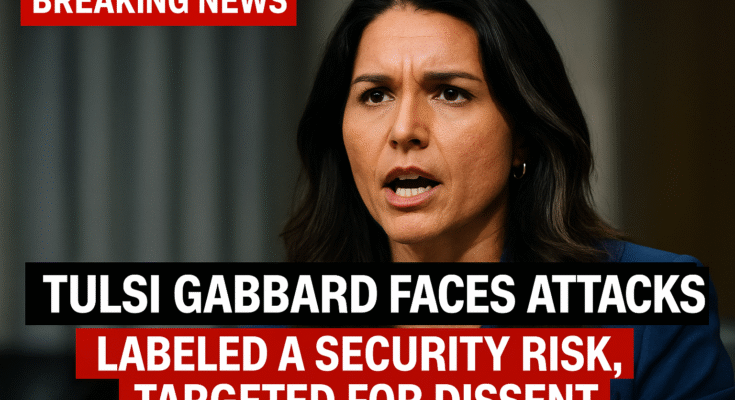Recent developments have thrust Tulsi Gabbard into the spotlight, with accusations and defenses swirling around her past actions and potential future roles. This post aims to break down the key points of the ongoing discussion.
The “Quiet Skies” Controversy
- A significant point of contention is Gabbard’s alleged placement on a government watch list known as “Quiet Skies.”
- CNN reported on this, suggesting it was due to her “overseas travel and foreign connections.” The report implies this is a new and shocking revelation.
- However, Gabbard herself publicly discussed being added to this list three months prior, stating she believed it was retaliation for criticizing the government and warning about a Kamala Harris presidency.
- She described the emotional impact of being labeled a domestic terror threat, especially given her military service post-9/11.
- Gabbard and her supporters, including Republican state representatives in Hawaii, claim she and her husband were harassed by Air Marshals on flights.
- The TSA, while not confirming Gabbard’s presence on the list, stated that “Quiet Skies” is a risk-based screening program and not a “terrorist watch list.” They deny that individuals are removed from the list simply because they publicly discuss it.
- A letter from a whistleblower attorney detailed the extensive security measures reportedly taken on flights Gabbard boarded, including K9 units, security analysts, and multiple Federal Air Marshals.
Nikki Haley’s Scathing Critique
Former UN Ambassador Nikki Haley has been a vocal critic of Gabbard, questioning her suitability for the Director of National Intelligence (DNI) role. Haley’s main points include:
- Iran Policy: Gabbard opposed ending the Iran nuclear deal, opposed sanctions on Iran, and opposed designating the Iranian military as terrorists. She also criticized the strike against Qasem Soleimani and sought to limit US war powers against Iran.
- Syria: Gabbard met with Bashar al-Assad in 2017 and expressed skepticism about his regime’s responsibility for chemical weapons attacks, statements Haley claims mirror Russian talking points.
- Russia/Ukraine: Haley asserts Gabbard blamed NATO for Russia’s invasion of Ukraine, and that Russian and Chinese media amplified her views.
- WikiLeaks & Snowden: Gabbard supported dropping charges against Julian Assange and pardoning Edward Snowden, individuals accused of leaking sensitive US secrets.
- China: Gabbard called for an end to the trade war with China.
Haley argues that these positions make Gabbard a sympathizer with Russia, Iran, Syria, and China, rendering her unfit to lead the US intelligence community.
Gabbard’s Defense and Broader Implications
- Gabbard and her defenders argue that the actions taken against her, such as being placed on the “Quiet Skies” list, are examples of the government weaponizing national security apparatus against political opponents.
- They contend that criticizing government policies or questioning foreign entanglements should not lead to being labeled a threat.
- The video host suggests that the media attacks on Gabbard are part of a broader pattern, following scrutiny of other figures like Matt Gaetz and potentially targeting individuals like Pete Hegseth and RFK Jr.
- The host also questions the legitimacy and transparency of government watch lists and the broad classification of information.
- There’s a strong sentiment that questioning US involvement in organizations like NATO or the UN is a valid exercise and does not equate to being an agent of a foreign power. The focus, it’s argued, should be on American interests.
The situation surrounding Tulsi Gabbard is complex, involving differing interpretations of her actions and the motivations behind the scrutiny she faces. As discussions continue, it raises broader questions about national security, political dissent, and the role of intelligence in a democratic society.



